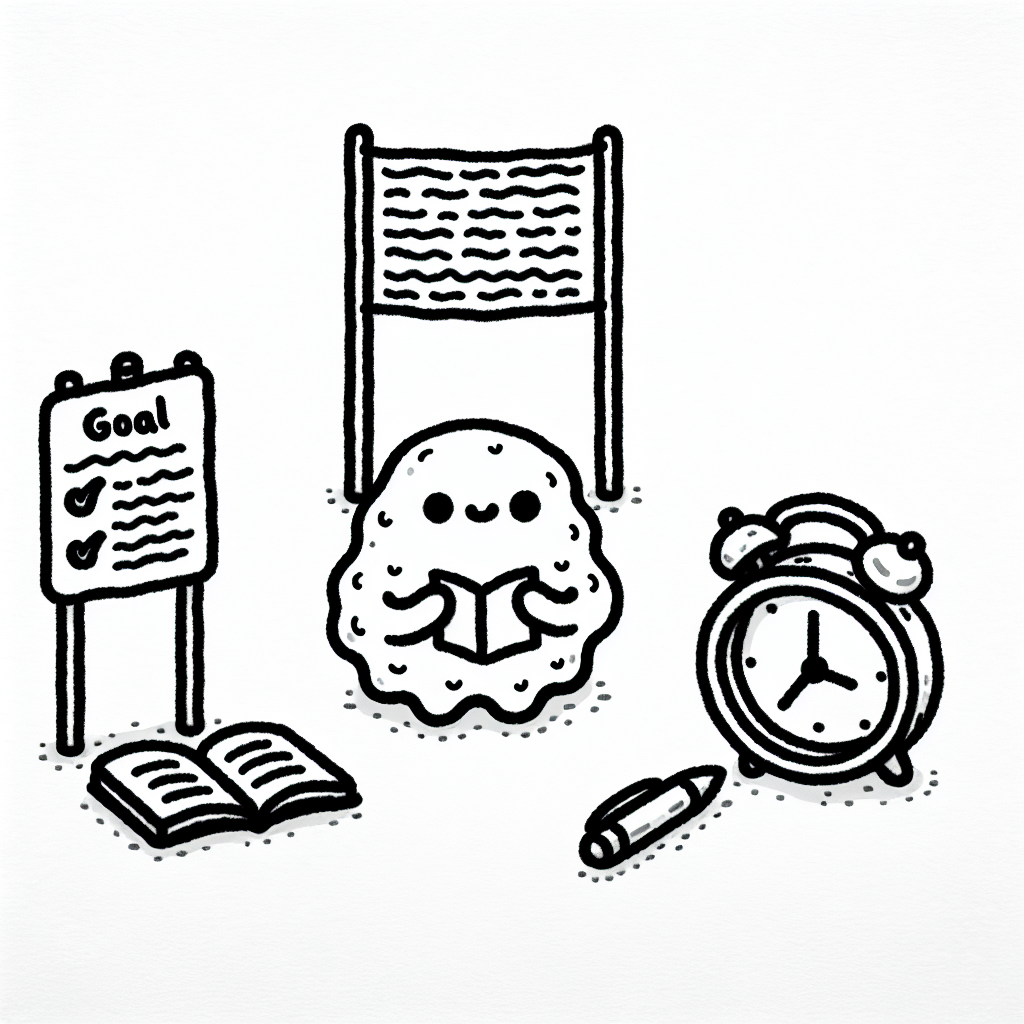Introduction
Building academic habits refers to the consistent behaviors, routines, and attitudes that support effective learning and academic performance. These habits include time management, goal setting, active reading, note-taking, and regular review of material. Strong academic habits help students stay organized, motivated, and prepared, ultimately improving their academic success.
In both traditional and online learning environments, cultivating strong academic habits is essential. In-person classes may offer structured schedules and physical reminders of obligations, but online learning demands greater self-discipline and autonomy. In both contexts, students with established academic habits are better equipped to manage workloads, meet deadlines, and retain information.
Key components of building academic habits include mindset, skills, strategies, and support systems. A growth mindset encourages students to view challenges as opportunities for improvement. Essential academic skills include note-taking, critical thinking, and effective communication. Strategies such as goal-setting, prioritization, and time-blocking help students work more efficiently. Finally, support systems—from peer study groups to academic advisors—provide encouragement and resources that reinforce positive habits.

Understanding the Learning Environment
Online vs. In-Person Learning
When building academic habits, it's essential to understand the differences between online and in-person learning environments. In-person courses typically follow a fixed schedule with real-time interaction between students and instructors. These classes offer structured routines, immediate feedback, and face-to-face engagement, which can help maintain accountability and motivation.
Online courses, on the other hand, often provide more flexibility but require greater self-discipline. Students may need to manage their time more independently and stay motivated without in-person prompts. Expectations in online courses include active participation in discussion boards, timely submission of assignments, and regular engagement with course materials.
Adapting study habits to fit the course format is crucial. For in-person classes, attending lectures, taking handwritten notes, and engaging in group discussions may be effective. For online learning, setting up a dedicated study space, establishing a consistent schedule, and using digital tools for organization can help maintain focus (Penn State University).
Navigating Digital Platforms and Course Tools
A strong understanding of digital platforms is key to building academic habits in modern learning environments. Learning management systems (LMS) like Canvas and Blackboard serve as central hubs for course materials, announcements, assignments, and grades. Familiarity with these systems allows students to navigate their coursework efficiently.
Scheduling and communication tools such as Google Calendar, Microsoft Outlook, and Zoom help manage time and facilitate collaboration. Using these tools to set reminders, attend virtual meetings, and communicate with instructors or peers supports academic consistency.
Finally, the course syllabus and academic calendar are essential planning tools. Reviewing syllabi at the start of each term helps students anticipate deadlines and prepare accordingly. Incorporating these dates into a personal calendar ensures proactive time management and reinforces a structured approach to learning.

Setting Clear Academic Expectations
Establishing clear academic expectations is a foundational step in building academic habits. It begins with setting meaningful goals and extends to effective time management and a strong understanding of academic integrity.
Goal-Setting and Motivation
To support academic success, students should define both short- and long-term academic goals. Short-term goals might include completing weekly assignments or preparing for an upcoming test, while long-term goals could involve maintaining a certain GPA or preparing for graduate school. Using SMART goals—Specific, Measurable, Achievable, Relevant, and Time-bound—provides a structured framework to enhance motivation and track progress. For example, rather than saying "I want to do better in math," a SMART goal would be "I will increase my math grade from a B to an A by the end of the semester by attending weekly tutoring sessions and completing all homework assignments on time."
Time Management and Scheduling
Effective time management is essential for building academic habits. Weekly planning strategies, such as using a planner or digital calendar, help students allocate time for classes, assignments, and study sessions. Tools like time-tracking apps and task management systems can assist in prioritizing responsibilities and identifying time-wasting activities. Building consistency in scheduling helps minimize procrastination and supports sustained academic performance. Establishing daily routines and breaking larger tasks into manageable parts also contributes to a more disciplined academic approach.
Understanding Academic Integrity
Academic integrity involves maintaining honesty and ethical behavior in all academic work. This includes avoiding plagiarism, cheating, and other forms of misconduct. Students should be familiar with discipline-specific formatting and citation practices to properly credit sources and uphold scholarly standards. Institutions are increasingly adopting alternative assessment strategies—such as open-book exams and project-based evaluations—to encourage authentic learning and reduce opportunities for dishonesty (University of Missouri–St. Louis). Understanding and practicing academic integrity reinforces the value of personal accountability and strengthens academic habits over time.

Developing Core Academic Skills
Reading and Note-Taking Strategies
Building academic habits begins with mastering effective reading and note-taking strategies. Active reading techniques, such as the SQ3R method (Survey, Question, Read, Recite, Review), help students engage with texts more deeply. Annotation—highlighting key points, writing margin notes, and summarizing passages—also supports comprehension and retention.
When it comes to note-taking, students often choose between digital and handwritten methods. Digital note-taking tools offer searchability and easy organization, while handwritten notes can enhance memory through the physical act of writing. Choosing the right method depends on individual learning preferences and the subject matter.
Writing and Research Proficiency
Strong writing and research skills are essential for building academic habits. Structuring essays, reports, and research papers involves creating clear introductions, coherent body paragraphs, and concise conclusions. Students must also learn to cite sources properly using styles like MLA, APA, or Chicago to maintain academic integrity.
Accessing resources such as university writing centers and online platforms can help students improve their writing. For example, the University of Georgia offers support for graduate students in developing communication skills.
Critical Thinking and Problem-Solving
Developing core academic skills also includes enhancing critical thinking and problem-solving abilities. Applying logic and reasoning to academic content allows students to evaluate arguments, identify biases, and make informed conclusions. Reflective and analytical thinking further supports the ability to question assumptions and synthesize complex information.
Effective Studying and Memory Retention
Effective studying techniques are a key part of building academic habits. Spaced repetition and active recall help reinforce information over time, making it easier to remember. Tools like mind mapping and concept linking aid in organizing ideas visually and understanding relationships between concepts. Additionally, participating in study groups and peer collaboration can expose students to diverse perspectives and reinforce learning through discussion.

Leveraging Technology and Campus Resources
Building academic habits involves not only personal discipline but also smart use of available tools and support systems. Leveraging technology and campus resources can significantly enhance learning and productivity.
Educational Technologies to Enhance Learning
Digital productivity tools like calendars, to-do lists, and Pomodoro timers help students manage time and break tasks into manageable intervals. These tools support consistent study routines, which are essential when building academic habits. For deeper learning, applications such as flashcard apps and mind mapping software aid in memorization and conceptual understanding.
AI Tools for Learning Efficiency
AI platforms like Google Gemini and NotebookLM offer new ways to streamline academic work. Students can use these tools to brainstorm ideas, summarize lengthy readings, and organize complex information. By automating repetitive tasks, AI tools free up time for deeper learning and reflection. According to Holy Family University, these technologies can support students in managing coursework more effectively.
Academic Support Centers
Universities provide a range of academic resources to aid student success. Tutoring centers offer targeted help in both STEM and humanities subjects, as seen at Oregon State University. Peer-led study sessions and faculty office hours create opportunities for collaborative learning and personalized guidance. Writing labs and communication centers, such as those at the University of Georgia, help students develop strong writing and presentation skills. Utilizing these resources is a practical step in building academic habits that support long-term achievement.

Building Communication and Collaboration Skills
Developing strong communication and collaboration skills is essential when building academic habits. These skills support effective interaction with peers and professors, as well as successful participation in group assignments.
Academic Communication Skills
Clear and respectful communication is key in academic settings. One important area is email etiquette. When emailing professors or peers, students should use a professional tone, include a clear subject line, and begin with a proper greeting. Messages should be concise, respectful, and free of slang or overly casual language.
Participating in online forums and class discussions also plays a vital role in academic communication. Students should make thoughtful contributions, respond respectfully to differing opinions, and stay on topic. These habits foster a productive learning environment and demonstrate engagement with course material.
Group Work and Team Projects
Effective collaboration in team projects begins with assigning clear roles and responsibilities. Team members should agree on individual tasks, set deadlines, and maintain open lines of communication. This structure helps prevent misunderstandings and ensures accountability.
Using collaborative tools can significantly enhance group productivity. Platforms like Google Docs allow for real-time editing and commenting, while communication apps like Slack enable organized, ongoing discussions. Mastering these tools supports smoother collaboration and is a key part of building academic habits.

Cultivating a Growth Mindset and Academic Resilience
Embracing Challenges and Feedback
Building academic habits requires a mindset that welcomes challenges and views setbacks as part of the learning process. A growth mindset encourages students to see mistakes not as failures but as valuable opportunities to improve their skills and understanding. Instead of avoiding difficult tasks, students with this mindset engage with them, knowing that effort leads to growth.
Equally important is the ability to seek out and apply constructive criticism. Feedback from teachers, peers, or mentors can highlight areas for improvement and guide future efforts. Rather than taking criticism personally, students should consider it a tool for refining their work and strengthening their academic performance.
Managing Stress and Avoiding Burnout
Developing strong academic habits also involves recognizing the importance of mental and physical well-being. Consistent self-care—adequate rest, balanced nutrition, and regular breaks—helps maintain focus and prevent burnout. Mindfulness practices, physical activity, and establishing healthy routines contribute to a more sustainable approach to academic work.
Students should also be aware of their limits and know when to seek support. Talking to instructors, academic advisors, or mental health professionals can provide assistance before stress becomes overwhelming. Building academic habits is as much about resilience and balance as it is about productivity and effort.

Conclusion
Building academic habits is essential for long-term educational success. Key practices such as consistent study schedules, active note-taking, setting realistic goals, and regularly reviewing material help create a strong foundation for learning.
Integrating these habits doesn’t need to happen all at once. Start small, focusing on one or two strategies that fit your routine, and build from there. Over time, these habits will become second nature, supporting your academic growth.
Remember, academic success is not achieved overnight. It’s a journey shaped by intentional habits and a commitment to continuous improvement. Stay consistent, be patient, and progress will follow.







.png)






